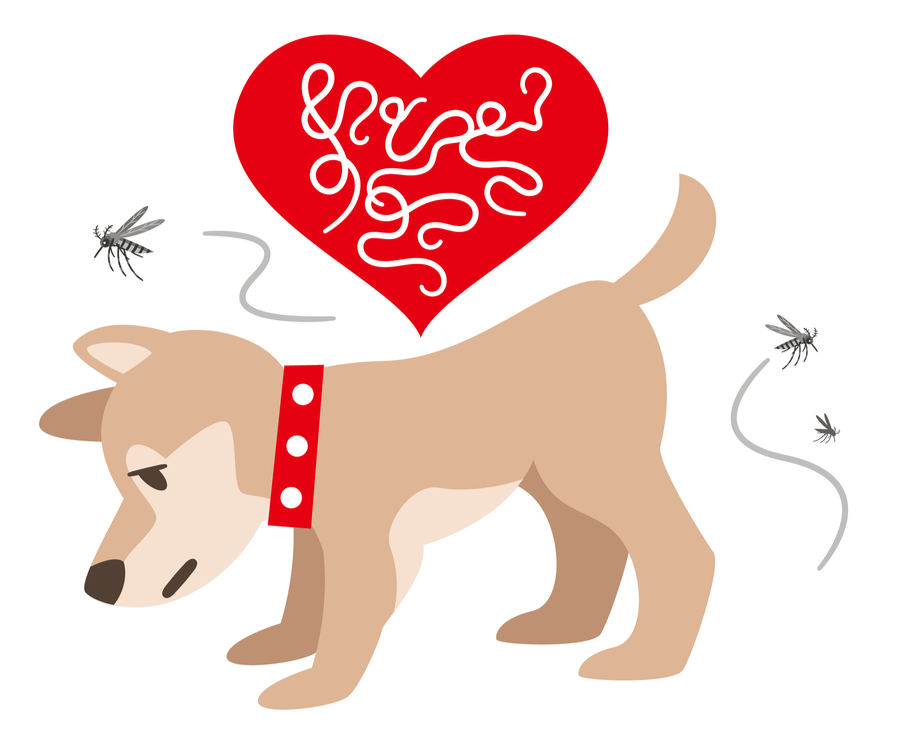Q: How do pets get heartworms?
A: All it takes is one bite from an infected mosquito to pass the parasite onto your pet! And, unfortunately, there’s no way to tell if a mosquito is infected. That’s why prevention is so important.
Q: Can people get heartworms from their pets? Can one pet give the heartworm disease to another pet?
A: Heartworm disease cannot be passed from pets to people, nor between pets. Heartworm disease can only be passed by mosquitoes.
Adult female heartworms living in an infected animal produce microfilaria that circulate in the bloodstream. When a mosquito bites an infected animal, it picks up these microfilaria. The microfilaria then develop and mature (during an incubation period of 10 to 14 days) into “infective stage” larvae. Until that incubation period is complete, the mosquito cannot infect other animals with the heartworm parasite.
Once the incubation period is complete, when the infected mosquito bites another mammal (commonly dogs, cats, ferrets, coyotes, wolves and foxes), the infective larvae enter the new host through the mosquito’s bite wound. Once inside a new host, it takes approximately 6 months for the larvae to develop into sexually mature adult heartworms begin to reproduce. Heartworms can live for 5 to 7 years in dogs, and up to 2 or 3 years in cats. Because of the longevity of the heartworm parasite, an infected pet can end up with many worms residing in their circulatory system.
In rare cases, people can get heartworms after being bitten by an infected mosquito (but never directly from their pet!) Fortunately, because people are not a natural host for heartworms, the larvae usually migrate to the heart and lung arteries and die before they become adult worms. The heartworm parasite is unable to complete its life cycle in humans. The heartworm will migrate to the lung and cause a round lesion.
Q: How can I test my pet for heartworm?
A: Fortunately, with a little prevention, our spring and summer seasons can still be enjoyed, despite these dangerous parasites! For dogs, it is recommended to perform heartworm testing on yearly basis. This involves taking a small sample of blood and checking for the presence of the heartworm parasite. Given the rise in tick-borne diseases, often laboratories will offer combination heartworm and tick-born disease testing! If the tests come back negative, preventative medication is dispensed, to be administered on a monthly basis throughout the season (May through November for ticks, and June through November for heartworm).
Q: How can I prevent my pets from getting heartworms? When should my pet receive preventative medication?
A: Preventative medication comes in two forms – either as a tablet that is taken orally, or as a liquid that is applied to their skin and absorbed. Different medications will protect your pet to varying degrees, so ask your veterinarian which medication is right for your pet!
Preventative medication should be administered on a monthly basis throughout the season (May through November for ticks, and June through November for heartworm). Preventative medication should be given beginning in the early spring, until the late fall to ensure that your pet receives protection during any month that will potentially have weather conducive for mosquitoes to thrive. Furthermore, if, during the colder winter season, you and your pet travel to warmer areas where mosquitoes are present, consider purchasing heartworm preventative medication for that time frame as well.
Depending on which preventative medication is selected, they often also include protection against ticks, fleas and various intestinal parasites such as roundworms, whipworms, or tapeworms. This also influences when to begin, and end, administering preventative medication, as certain parasites, like ticks, will pose a threat to your pet in cooler temperature.
Q: Is it OK to adopt a dog with heartworms?
A: Pets suffering from heartworm are adoptable, however, owners have to be dedicated to having the disease treated appropriately, because it can be fatal, if left untreated.
Q: What are the symptoms of heartworm infestations in dogs?
A: It can be difficult to tell if your pet is infected with the heartworm parasite, just by looking at them, because initially, there are no symptoms. By the time your pet begins exhibiting noticeable symptoms, the infestation can be quite severe, potentially life-threatening, and even fatal.
Heartworms typically reside in the heart, lungs and general circulatory system (blood vessels), where they mature into adults and begin to reproduce. As the worms reproduce, they crowd the heart and lungs. At this stage, most dogs will develop a persistent cough. As it progresses, they won’t be able to exercise as much as before – they will fatigue after moderate activity. With severe heartworm disease, pets may develop heart failure, abnormal lung sounds will be noticeable, and they can retain fluids. Heartworm disease can be fatal, if the worm infestation is not treated.
Q: If my dog gets heartworms, what’s the treatment? How much will it cost?
A: Treatment of the heartworm disease includes an extensive pre-treatment workup, including X-rays, blood work, and potentially additional tests to establish how serious the infection is. Then the dog is then given injections to kill the adult heartworms in the blood vessels of the heart. The cost of treatment is significantly more expensive compared to the cost of preventative medication.
Q: If an animal gets heartworms, and is treated for them, can they get them again?
A: Yes, pets can repeatedly get infected with heartworm. That’s why prevention is so important
Resources:
American Heartworm Society – https://www.heartwormsociety.org/pet-owner-resources/heartworm-basics
WedMD – https://pets.webmd.com/dogs/guide/heartworms-in-dogs-facts-and-myths#1


